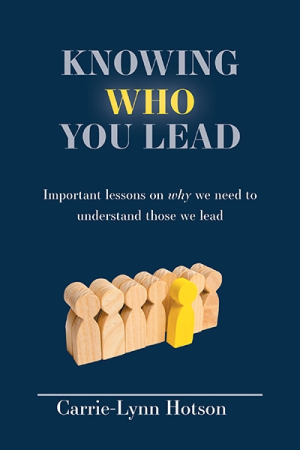Knowing Who You Lead
Important Lessons on Why We Need to Understand Those We Lead
Knowing Who You Lead is a leadership guide that names actionable strategies for building effective teams.
Carrie-Lynn Hotson’s empowering leadership guide Knowing Who You Lead fosters understanding of those whom one leads—and of oneself—to institute lasting change and organizational growth.
The work draws from Hotson’s extensive experience to develop twenty lessons for building leadership skills, as well as for enhancing performance and conflict management. They aim to get at the root causes of employee and team issues, addressing the sort of concerns that lead to employees to leave their organizations. Straightforward tools are suggested, including a predictive index job assessment tool, which is recommended to help leaders learn the behaviors and traits that are needed for a specific job based on the traits of their current employees; and the trigger activity, wherein participants write down expressions used by other employees that upset them, to help in eliminating conflict and building trust and dialogue. The central goal is to create strong, inclusive teams, contributing to organizations that embrace growth.
The book’s self-assessment questions reflect how leading a virtual team can affect a leader’s successes. They also reveal the changes that a leader needs to make in such set-ups; show how much time a leader should set aside to resolve employee conflicts; and mull over whether leaders’ workforces are diverse and inclusive. Ensuring equity within organizations is a concern of the book’s; it is raise the topic often.
For ease of understanding, the book uses hockey analogies to clarify its key concepts. Thus, a coach’s roles (watching and guiding players) are compared to a business leader’s roles in supervising and leading their teams. And, like the success of a hockey team lies in having both skilled players and an effective coach, the same applies within organizations. Personal anecdotes are also incorporated, as with Hotson’s experiences as a parent: she learns her son is a body kinetic learner, and that different children learn in different ways, just as employees learn in diverse ways. Hypothetical scenarios are also used to illustrate the text’s points, as about revelant, team-specific performance appraisals.
Still, many of the book’s valuable lessons—including learning from previous mistakes, refraining from labeling employees, the value of hiring employees who are different, and on importance of one’s listening skills—are familiar ones. Further, they are presented without fresh material, making their suggestions for achieving effective leadership and team-building feel stale. Nonetheless, the book stands to help leaders identify and address the basic causes of issues within their organizations, and its systematic step-by-step process is a valuable one.
Knowing Who You Lead is a leadership guide that names actionable strategies to help bosses get to know their employees and build effective teams.
Reviewed by
Edith Wairimu
Disclosure: This article is not an endorsement, but a review. The publisher of this book provided free copies of the book and paid a small fee to have their book reviewed by a professional reviewer. Foreword Reviews and Clarion Reviews make no guarantee that the publisher will receive a positive review. Foreword Magazine, Inc. is disclosing this in accordance with the Federal Trade Commission’s 16 CFR, Part 255.

